
21st-century Renewal Ministries is an independently owned and managed online local church and spiritual growth consulting ministry that emerged from the consulting activities of United Methodist Pastor Dale R. Turner, which began in 1997 when he was the pastor of Poland United Methodist Church in Poland, Ohio. Since then, he has consulted with or trained consultants to work with over 400 local churches in several United Methodist annual conferences, including Ohio, Minnesota, New Jersey, New York, and Pennsylvania. Pastor Bill Easum’s “Church Growth with Integrity” and Dr. Stanley Menken’s consulting ministry, Menken and Associates, influenced Dale’s consulting ministry, which focused on Percept demographic resource tools. Dale is the author of “TLC Groups for Busy Disciples” and “31 Ways that You Can be Rich,” both published on Amazon in eBook and paperback forms.
Click here to learn more about Dale Turner: /https://daleturner.org/about/
Click here to join the 21st Century Renewal Ministries Email list and receive a free weekly devotional page entitled “Wisdom from the Cross”. /https://daleturner.org/contact/
Dale offers a free weekly devotional page entitled “Wisdom from the Cross”.
To see a list of past weekly devotional pages, click here and click on “Wisdom from the Cross.” /https://daleturner.org/

Click here to see a sample devotional page for “Wisdom from the Cross.” /https://daleturner.org/hope
Dale also offers a free spiritual gifts survey with complete spiritual gift definition pages and a local church volunteer ministry work sheet all combined into a free booklet. Click the link below to download and/or print a copy of the booklet. Permission is hereby given to make as many copies as needed to use with your local church.
/https://daleturner.org/spiritual-gifts-booklet/
Pictured below is a copy of the Spiritual Gifts Survey. As a theological Wesleyan Arminian I have designed this booklet from a Methodist point of view. I have listed 15 of the more common spiritual gifts generally known as the “service gifts”. The gifts included are (in alphabetical order) Administration, Evangelism, Exhortation, Faith, Giving, Healing, Helps, Knowledge, Leadership, Mercy, Prophecy, Service, Shepherd, Teaching, Wisdom.
I have also included a sample copy of the spiritual gift definitions that are included in the booklet. Also included is a copy of the “Opportunities for Ministry work sheet“. Our church used these tools to help new members identify their spiritual gifts, learn their meaning and apply them in the ministry teams of the congregation.
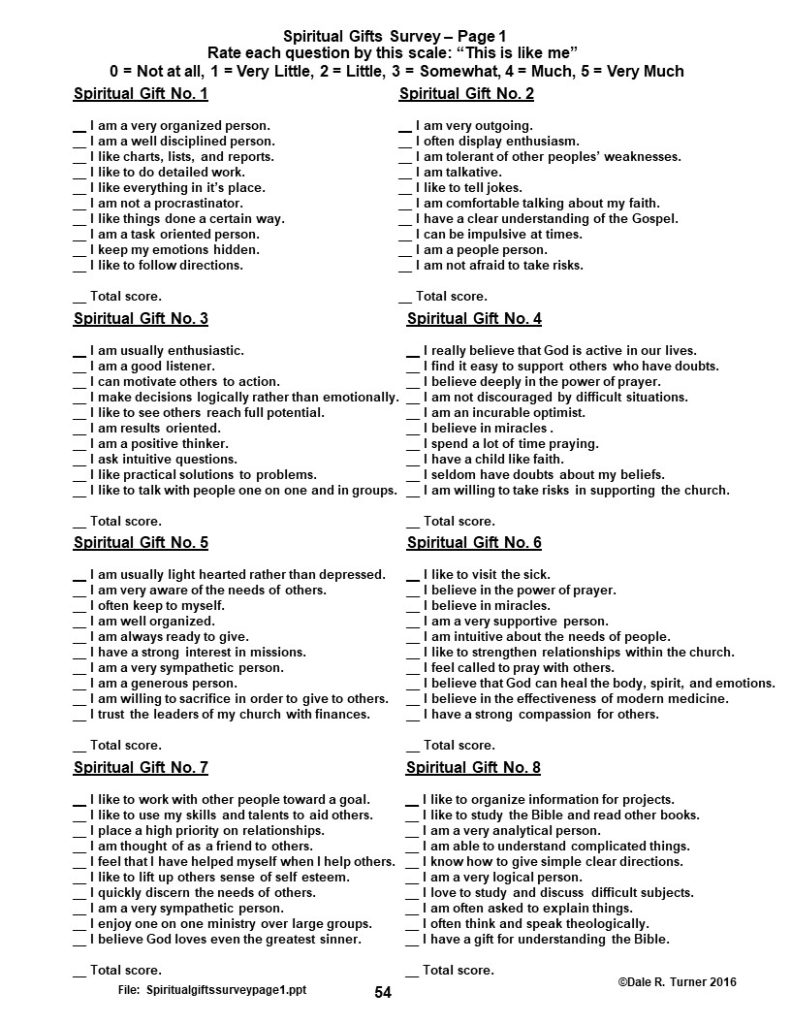
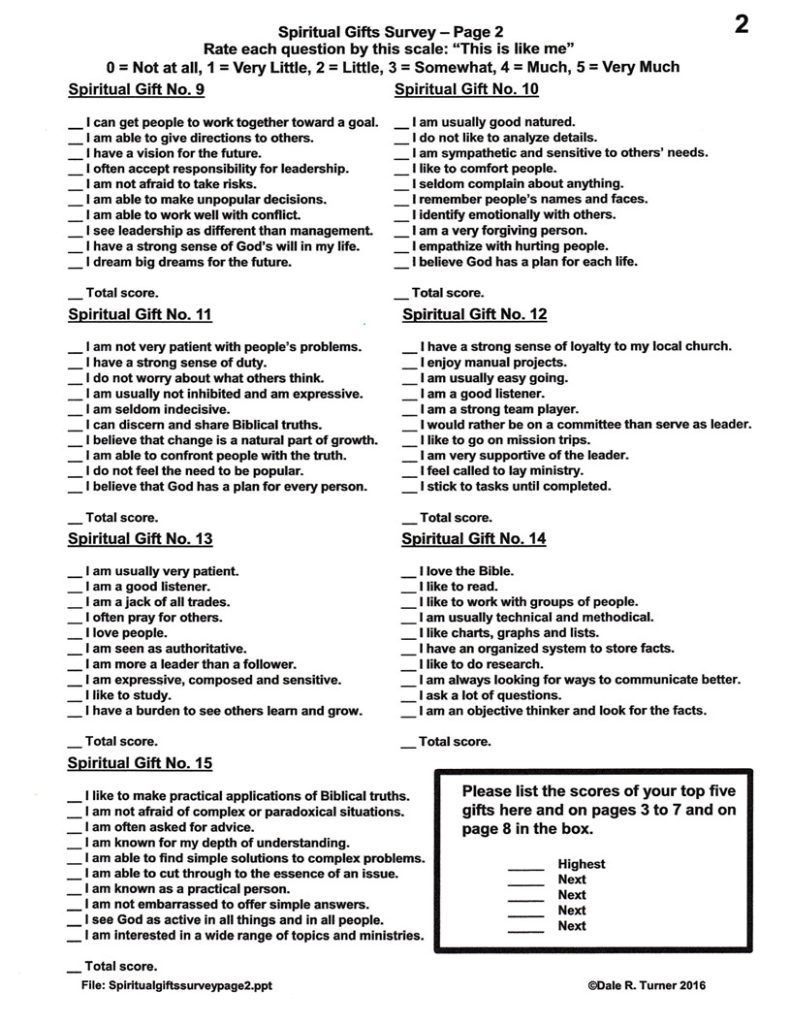
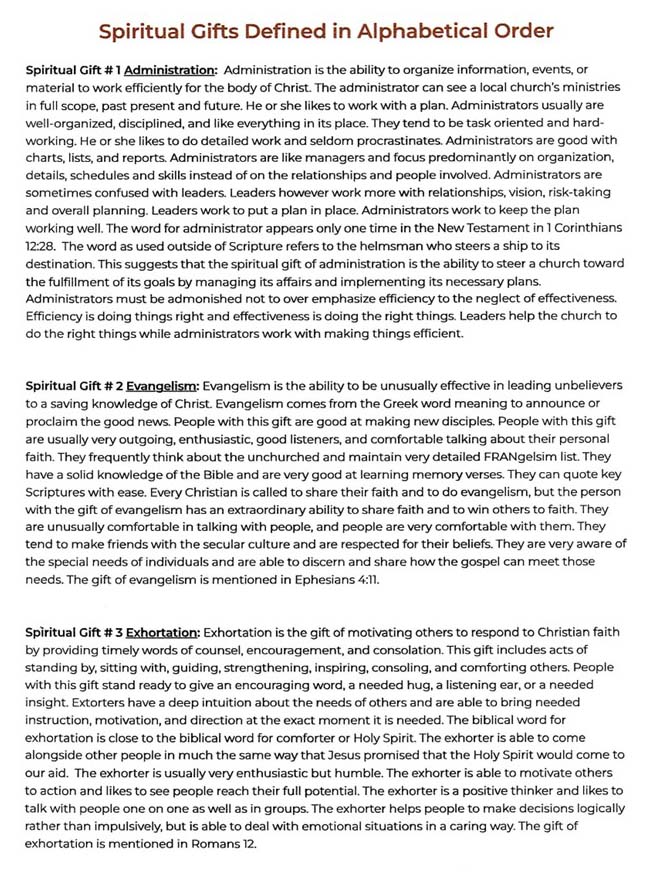
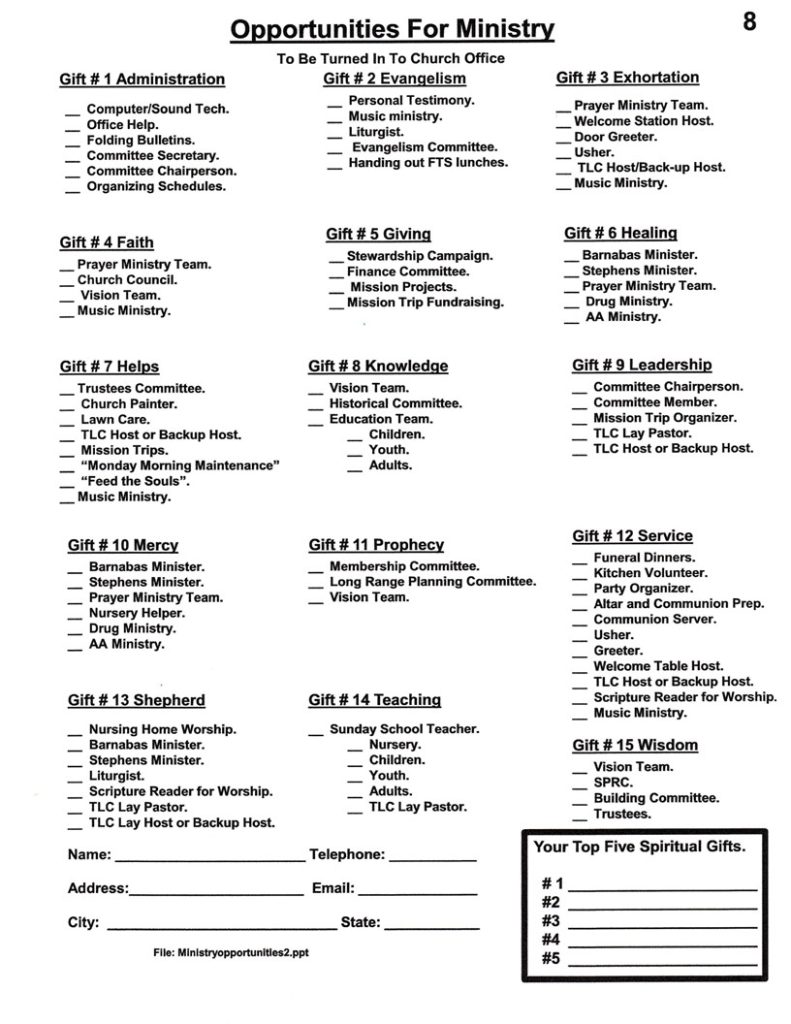
Dale also offers a free 144-question church growth survey tool called The First 100 Days.
Click here to download instructions on how to use the First 100 Days Survey for your church (free of charge).
/https://daleturner.org/first-100-days/download-first-100-days-app/
Listed below is some background information on the survey along with samples of the report the survey generates. Also listed is the list of the 144 survey statements. During a national survey, conducted by Dale using these statements, it was discovered that several United Methodist churches doubled their average worship attendance over a ten-year period from 1995 to 2005. Column 6 of the report lists the combined scores of the pastors, staff and laity in church that doubled their worship attendance. Column 7 of the report compares other churches doing the survey with the growing churches and places a K (for key planning point) in column 7 when church score is 20% or more less than the growing churches.
I have come to the conclusion that whenever an individual or an organization says, I/we want to grow, six principles come into play. If growth is not happening, then one or more of the principles is being neglected. I also believe that the principles must follow, more or less, a specific order. Faith, for example, always comes first and vision and leadership follow close behind. Structure and process are critical, but many organizations spend their entire life stuck on the issues of structure and process. Faith, vision and leadership can renew structure and process, but without mission they will miss the whole point. The reason for faith, vision, leadership, structure and process is to mobilize the church for mission.
As I have continued to seek understanding in the areas of Faith, Leadership, Vision, Structure, Process and Mission formation, I have worked with numerous churches. I have discovered that pastors and lay servants struggle with the same questions that challenged me. Over time I began to expand and develop the formational principles into twenty-four sub-categories of developmental basics, and then eventually into a First 100 Days Web Based Survey with 144 key questions. Listed below are the 24 developmental basics listed under the six formational principles. The basics cover a variety of areas that include local church staffing, programming, development of facilities, conflict resolution, and more.
Here are the formational principles stated in my own words.
The Faith Formational Principle.
All growth is based on our deepest beliefs.
The Leadership Formational Principle.
Leadership gives the motivation for growth to happen.
The Vision Formational Principle.
Vision dreams the way to growth and develops a definite method (plan).
The Structure Formational Principle.
Organization builds relationships and gives permission through which growth happens.
The Process Formational Principle.
Continuous systematic action keeps growth going.
The Mission Formational Principle.
Growth actually happens when individuals voluntarily accept the operational tasks of the vision as their mission.
I define church growth by two criteria, 犀利士 1). Has the congregation actually helped someone to be in mission, and 2), has the average worship attendance increased significantly during the past ten years? I see this not as an either/or criteria but as a both/and criterion. From my personal experience as a pastor, congregational development specialist, and district superintendent I have devised this web-based survey to test my ideas. During 2004 and 2005 I surveyed 99 United Methodist churches including 99 pastors, 136 paid staff and 404 volunteer leaders.
Following are examples of the Survey report and the 144 survey statements.
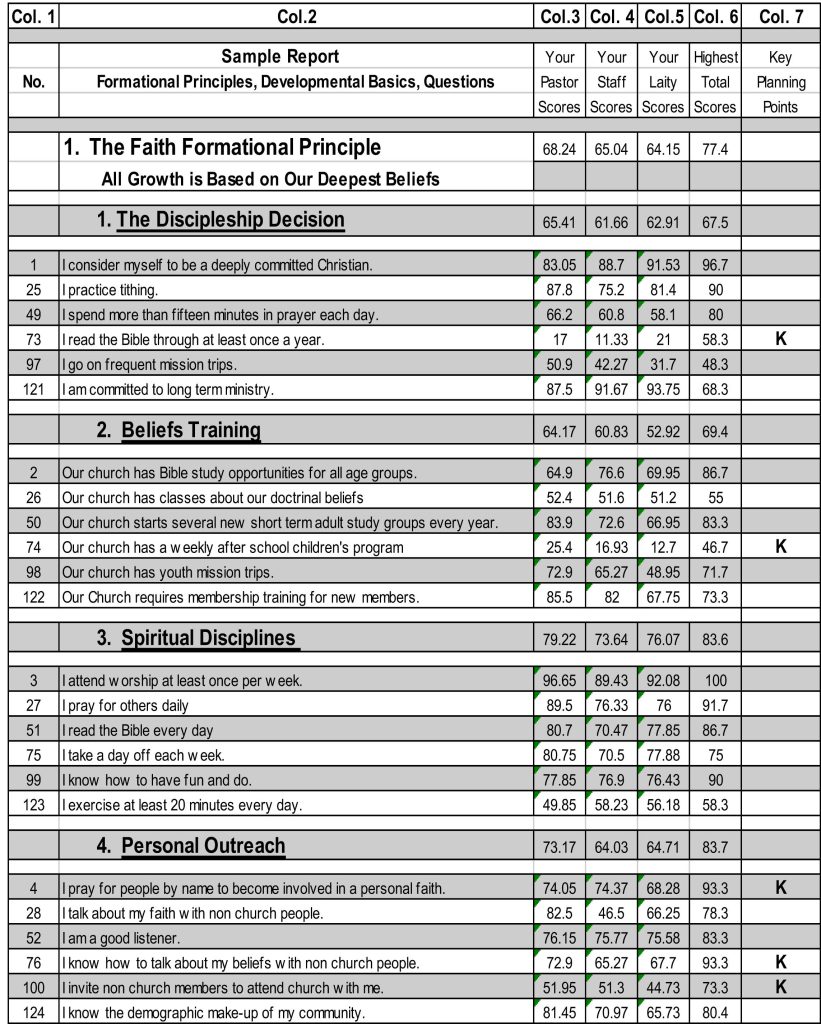
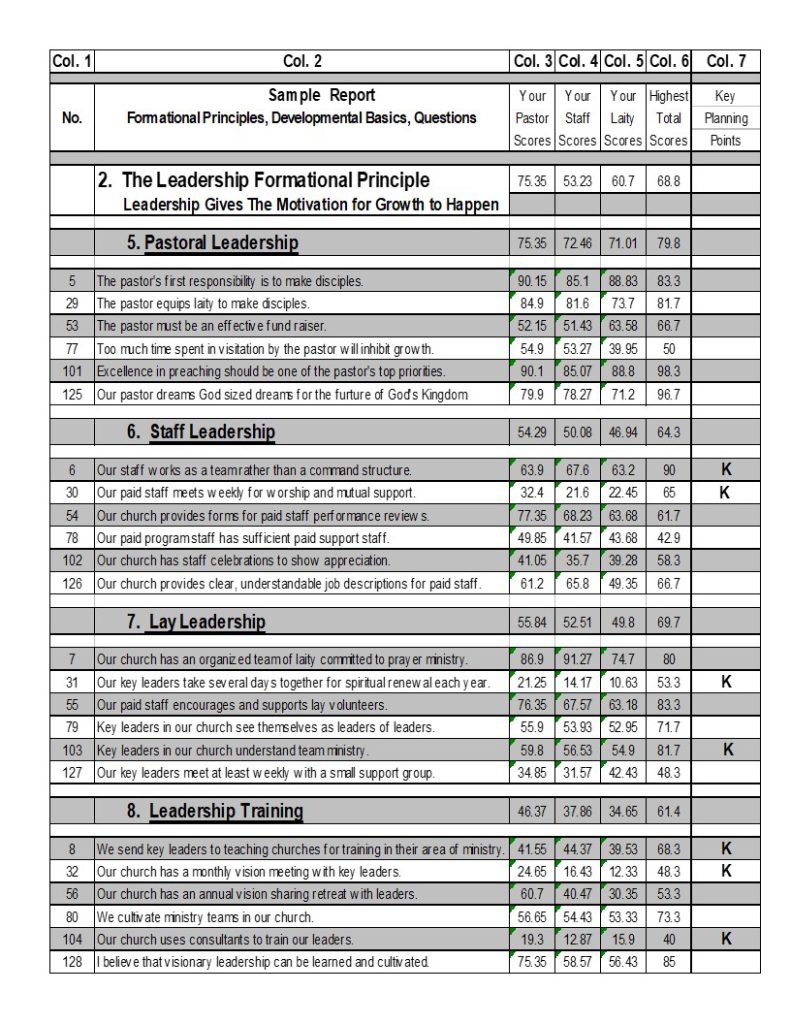
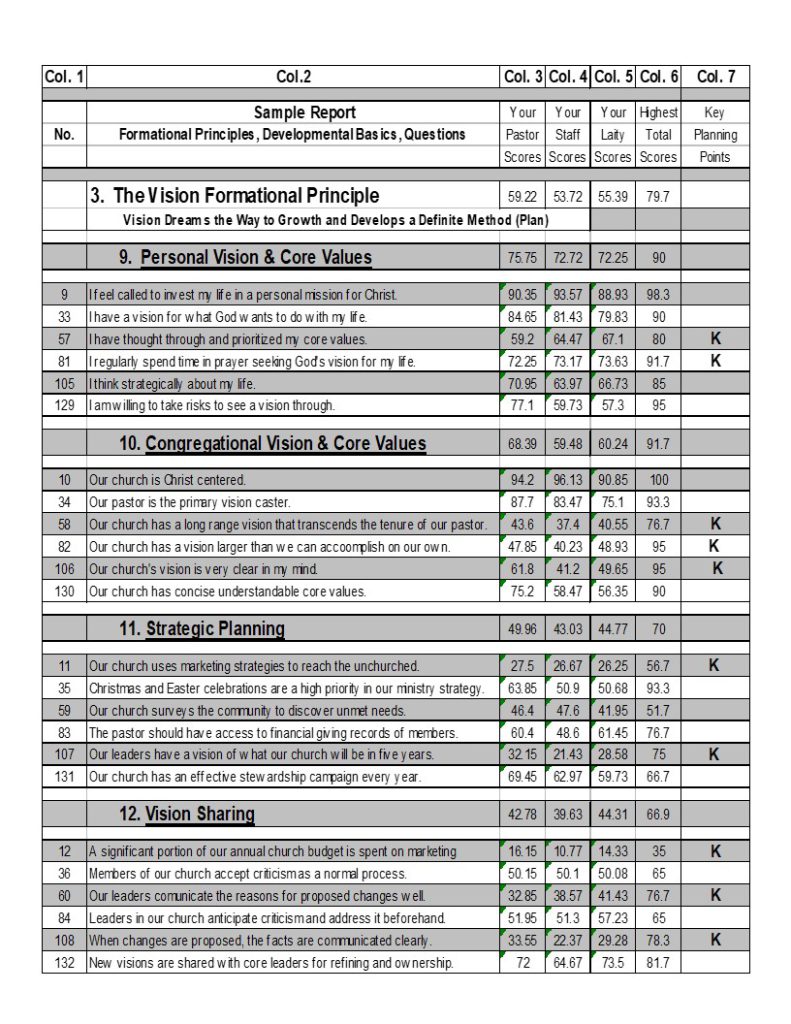
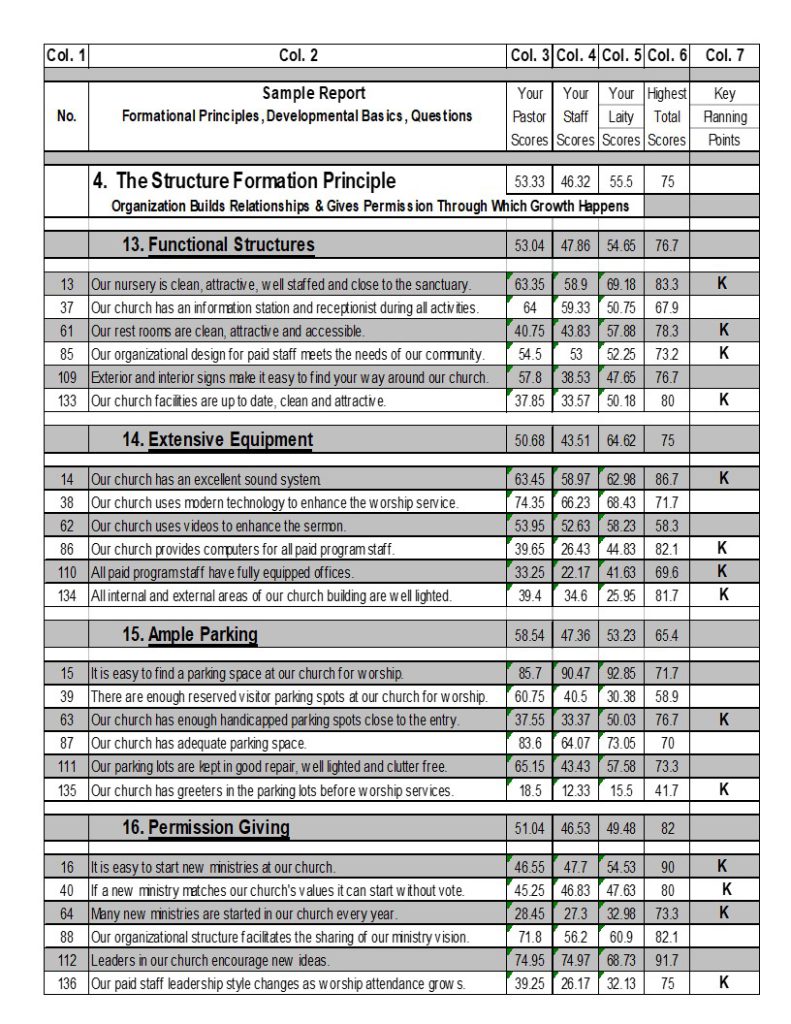
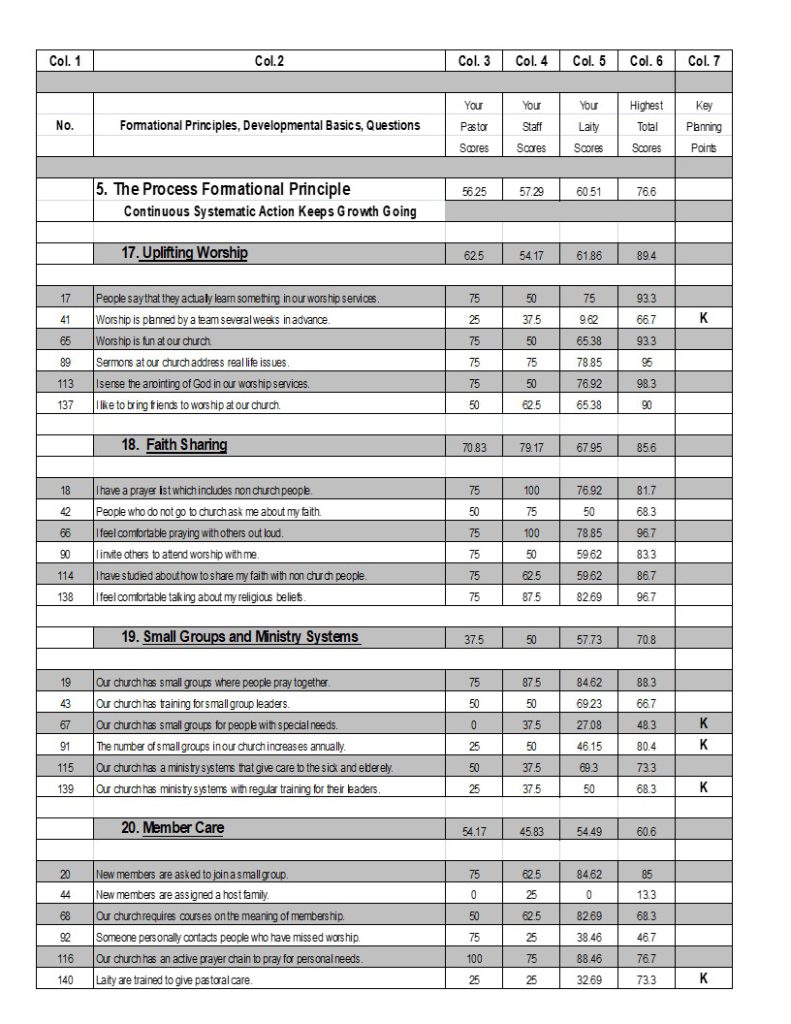
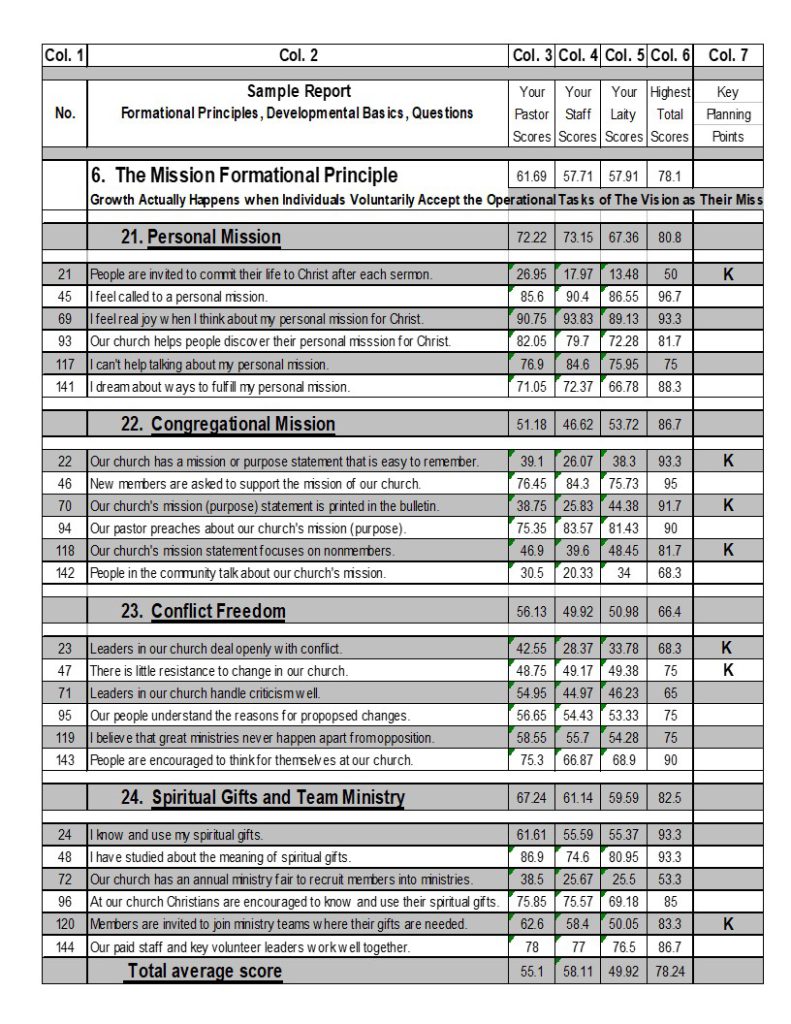
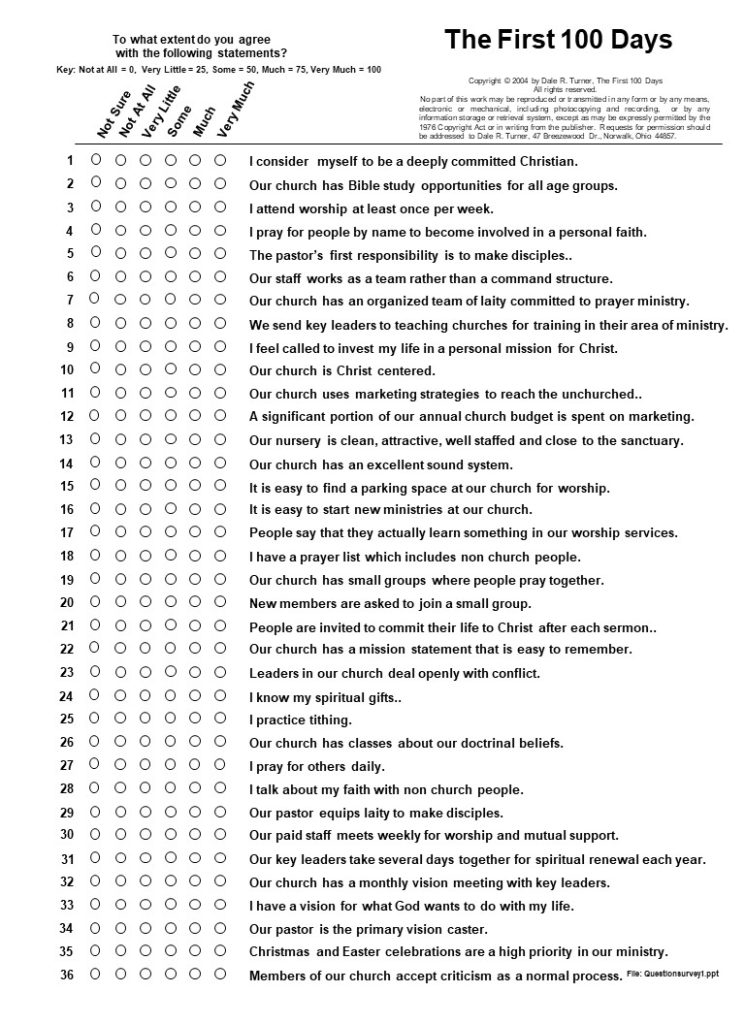
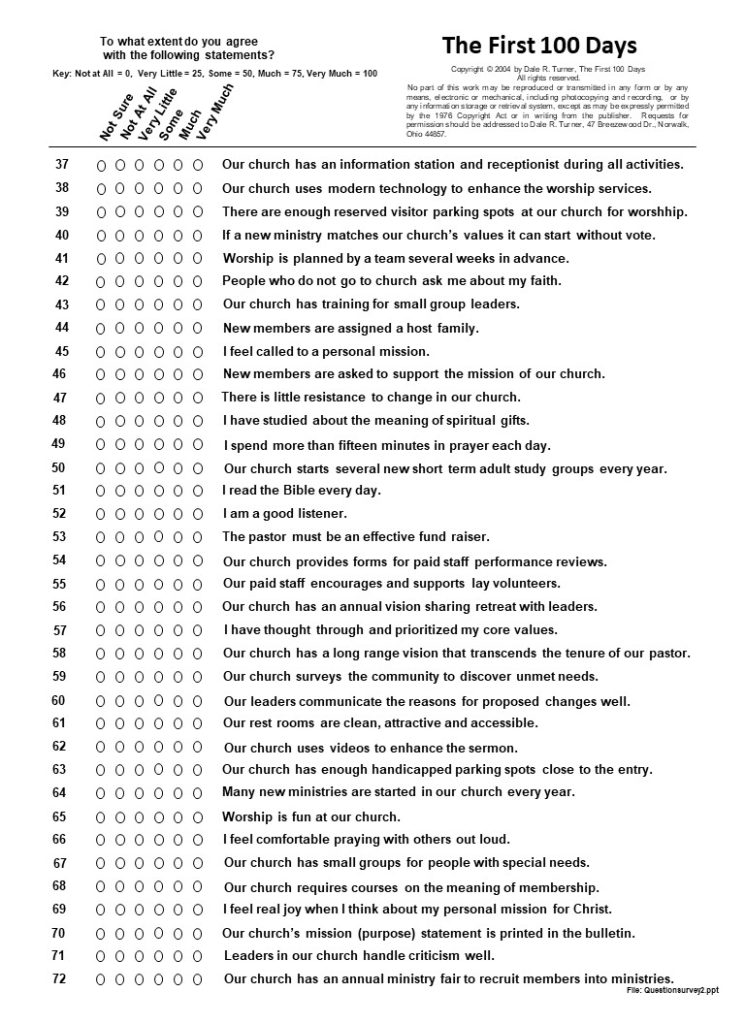
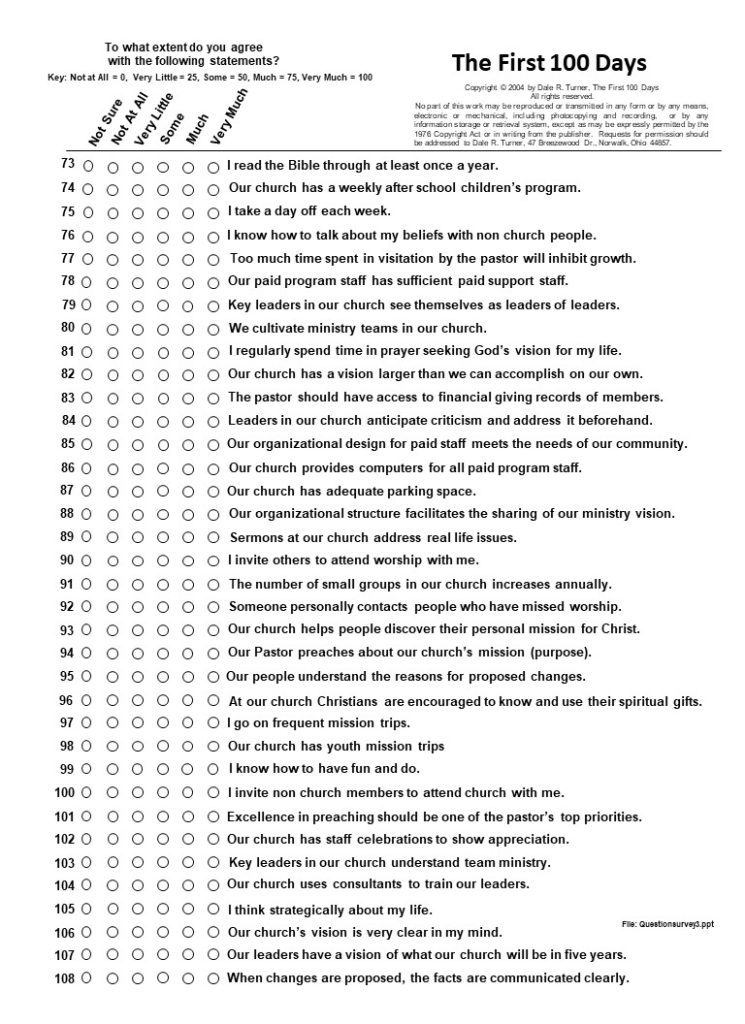
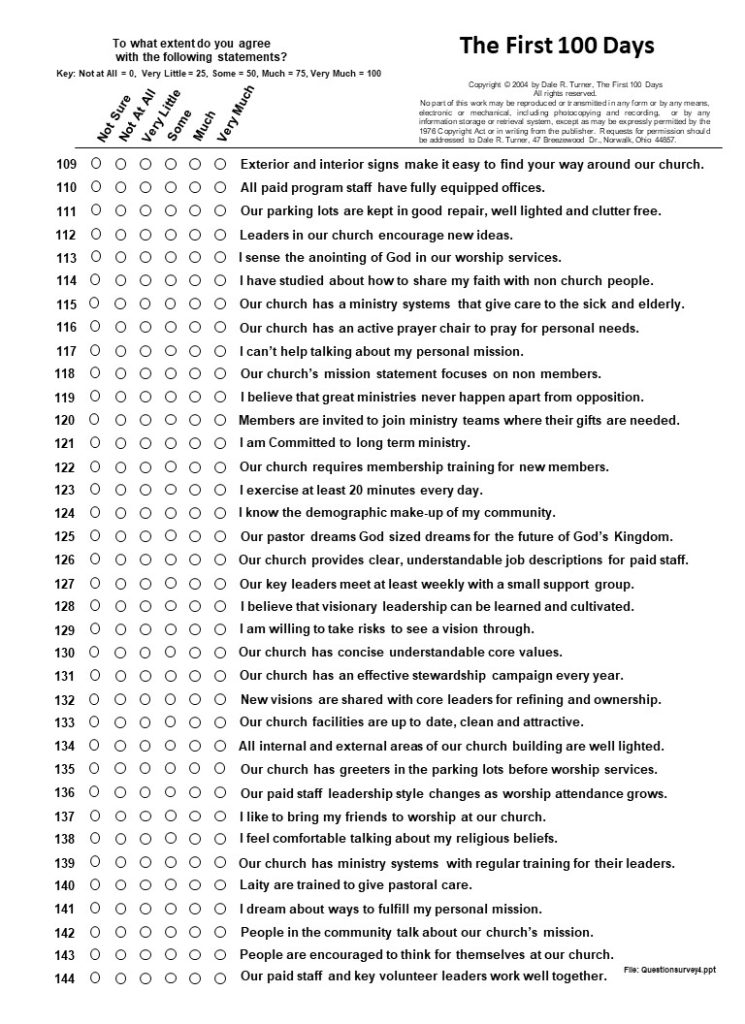
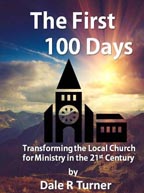
This is a new book by Dale Turner scheduled for publication in the future. The book is the result of the online study using the 144-question survey. The survey was completed by ninety-nine lead Pastors and 400 laity/staff. About 15 of the churches surveyed doubled their worship attendance over a ten-year period. The book is accompanied by a free survey using the 144 questions, enabling pastors, staff, and laity to evaluate their own ministry. Dale Turner will be available to do consulting with local churches using this book and the survey. Contact
dale at dale6@roadruner.com for details and expenses.
Click here to download instructions for the survey. Print the instructions and follow to download the survey app to a single computer at your church. Use that computer and the instructions to have your staff and laity complete the survey. When the book is published you will be able to match the 144 growth prescriptions in the book to your survey results. Pastor, you can become your own church growth consultant!
/https://daleturner.org/first-100-days/download-first-100-days-app/